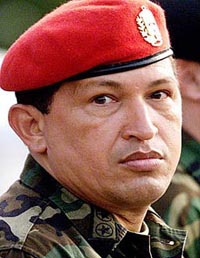Venezuela's Chavez denounces international criticism of decision to remove TV station
President Hugo Chavez claimed Thursday that a right-wing conspiracy led by Washington is out to demonize his government for forcing an opposition TV channel off the air.

The government refused to renew the license of Radio Caracas Television, or RCTV, forcing the channel off the air Sunday and sparking both angry protests at home and condemnation abroad from governments, press freedom groups and international organizations.
Speaking during an event Thursday with the visiting leader of Vietnam's communist party, Chavez said "international rightist, extreme-rightist and fascist movements are attacking Venezuela from everywhere - from Europe, the United States, Brasilia."
He targeted Brazil's Senate for approving a motion earlier in the day including a call for Chavez to reopen the channel.
"Nobody should interfere," Chavez said, accusing lawmakers in Brazil of "repeating like a parrot what is said in Washington."
"To those representatives of the Brazilian right, I say that it is much, much, much more probable that the Portuguese empire will again install itself in Brasilia than that the Venezuelan government will return the expired (broadcast) concession to the Venezuelan oligarchy," Chavez said.
Chavez accuses RCTV of helping incite a failed coup in 2002 and violating various broadcast laws. During the coup, RCTV and other private channels broadcast opposition calls for protests to overthrow Chavez while giving scant coverage to his return to power amid protests by his supporters.
RCTV denies wrongdoing, but critics argue many countries would yank the license of any channel that allows government foes to openly call for a rebellion.
Also Thursday the Atlanta-based Carter Center joined the European Union, the Chilean Senate, the U.S. government, Human Rights Watch, Reporters Without Borders and others who have said RCTV's removal could chill free speech in Venezuela.
The organization founded by former U.S. President Jimmy Carter, which has observed past elections here, expressed concern that "non-renewal of broadcast concessions for political reasons will have a chilling effect on free speech."
"A plurality of opinions should be protected," it said. "The right of dissent must be fiercely defended by every democratic government."
The center said if the government wants to deny renewal of a license based on alleged crimes, "these should be tried through the justice system before a decision is made."
Paris-based media watchdog group Reporters Without Borders accused Chavez of seeking to stamp out the country's opposition media entirely.
"Media that criticize the government will be snuffed out one by one until only the pro-government media are left," it said.
Relative calm returned to the streets after three days of protests and clashes between police and angry crowds hurling rocks and bottles.
University students planned to hold another large protest in Caracas Friday.
Subscribe to Pravda.Ru Telegram channel, Facebook, RSS!


